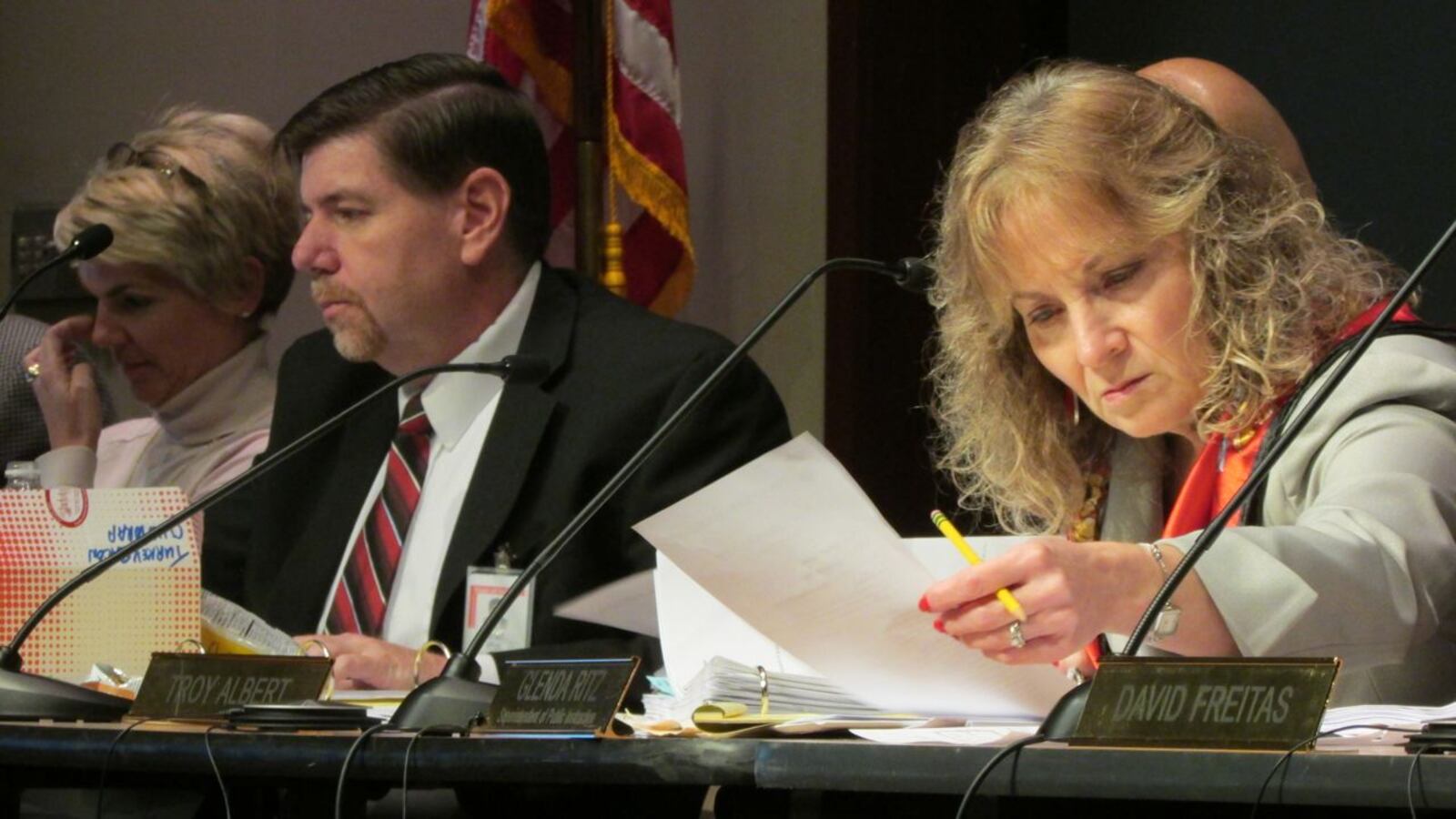Late moves by the legislature could cost state Superintendent Glenda Ritz her primary role overseeing school A-to-F grades along with the guarantee that she lead the Indiana State Board of Education.
Changes over the last week of the legislative session — which ends Wednesday — would broaden the state board’s powers at Ritz’s expense. But in a twist, Ritz might get an extra year as board chairwoman if the bill passes as it is now written.
Senate Bill 1, as it is now, would give the state board authority to receive student test data so it could calculate A-to-F grades on its own, independent of Ritz and the Indiana Department of Education.
To make that possible, lawmakers would give the state board a new designation with the U.S. Department of Education as a “state education authority,” which is designed to allow the Indiana Department of Education to share student data that otherwise would require parental consent.
Both issues — A-to-F grades and access to data — have been a source of tension between the Ritz and the state board. The board has complained the last two years that A-to-F grades should have been issued sooner and criticized the education department’s oversight of the process. The board has also sought to deal directly with federal officials, sometimes over Ritz’s objections. The state board has asked the Legislative Service Agency to check the calculations by Ritz’s team the past two years.
The new designation would make it easier, state board member Brad Oliver said, for the board to oversee A-to-F grades. The department has, at times, withheld data by citing legal concerns under federal laws aimed at protecting student personal information, he argued.
“There’s a lot of consequences, a lot of high stakes, around those letter grades, and the board wants to get it right,” Oliver said. “With all due respect, handing me a spreadsheet with a recalculated letter grade is not giving me everything.”
But Ritz’s spokesman, Daniel Altman, said the board has always gotten the information it has asked for.
“My understanding is that we’ve gotten them the data they’ve looked for,” Altman said. “They don’t trust our arithmetic? That’s why LSA runs independent calculations of our A-to-F grades, and we’ve done that based on the request of the State Board of Education.”
The bill was discussed today in a special committee designed to work out differences of language between versions from the House and Senate.
“This has been a work-in-progress since day one, and we think this is a good compromise from what has been proposed,” said the bill’s author, Sen. Travis Holdman, R-Markle. “It’s not been necessarily about who the chair of the board is as much as being able to get the job done, and from a practical stance, doing what needs to be done by board members.”
Working with the federal government
The board already qualifies as a “state education authority,” state board spokesman Marc Lotter said in an email, but those rights would be strengthened by making that clear in state law.
Yet the state’s relationship with the federal government, especially the question of who serves as the local point of contact, has been an ongoing source of friction over the past year.
Some state board members were frustrated, for example, that Ritz controlled the process of managing the state’s agreement with the U.S. Department of Education under the federal No Child Left Behind law. Last year, when federal officials raised questions about whether the state was adhering to a “waiver” that frees Indiana from federal sanctions under NCLB, the state board was so critical of Ritz’s handling of the negotiations that state board staff sent a critique of her work on the issue to the federal education department.
But Ritz retained control over the waiver talks because the department was the state agency that signed the waiver agreement, not the state board.
Oliver said the changes to Senate Bill 1 would not change the way the state manages its NCLB waiver, however.
“The board has been very clear about that it does not have an interest in trying to put together the waiver,” Oliver said. “I don’t see anybody racing to micromanage the department.”
Altman also said changing what the board is called doesn’t change that the education department is the “state education agency” in the eyes of federal officials, or the primary body that deals with federal programs such as extra funds for poor children, the state’s NCLB waiver and other matters of school supervision. As the official state agency, the department also holds all student data.
“(State education agency) is a federal definition,” Altman said. “I don’t think there’s any question that the department of education is the state education agency.”Shifting control
The bill also would expand the state board’s powers in other ways.
For example, it would re-assign the duties of the Education Roundtable, which lawmakers have moved to dissolve, to the state board, including the power to set passing scores on state tests.
But a few changes to the bill would seem to benefit Ritz, especially a change that would leave her in place as board chairwoman until after the 2016 election. Then the board could select a new leader by a vote of its members.
As it stands now, the bill also would reshape the rest of the state board, including shrinking it.
Instead of a 11-member board as it is now, the legislation would create a nine-member board composed of the state superintendent with six members appointed by the governor. Four of the governor’s appointees would be required to be educators, two would be chosen from each of the three court of appeals districts that divvy up the state in thirds geographically. No more than four members could be from a single political party, and one member each would be appointed by the House speaker and the Senate president.

